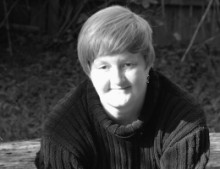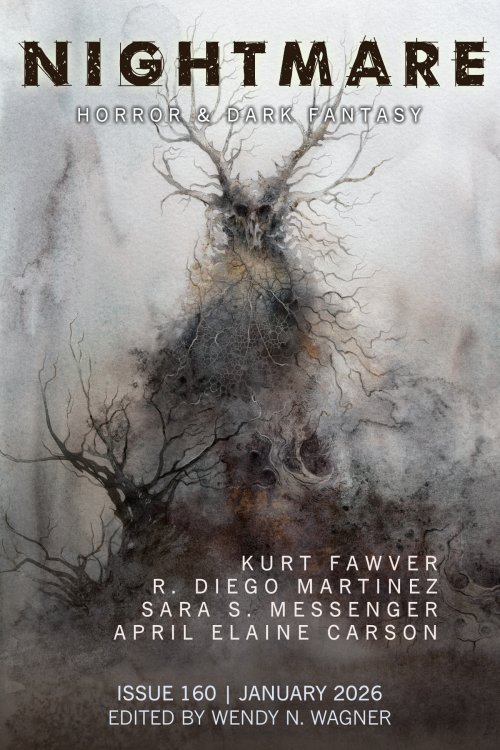Tell us a bit about the inspiration behind “Our Very Best Selves!”.
I think it started out in my head with the scene where the eyeball falls out of Muniza’s socket, and this almost sitcom style uh-oh moment where there’s just the worst person in the world witnessing that. The shame of falling apart while under intense, unsympathetic scrutiny. Then I got to thinking: what are the emotional stakes of that situation? Why is it embarrassing or dangerous? And why is their eyeball falling out in the first place? Then I thought of attachment styles—I’d been thinking of using anxious and avoidant attachment styles to inspire character traits in a couple. Where one half of a couple was very attentive to relationship details and another who was very distant and aloof from that. Later I decided this would be an abusive marriage, so Nadeem became a very horrible person.
Then when it comes to the voice of the piece and how the rest of the story unfolds, so much content targeting women in relationships is oblivious of the real radical work of being your authentic self in all situations required. Especially in some collectivist cultures, there’s already a huge emphasis on a woman fixing her marriage, fixing herself, stopping herself from falling apart. So this was the envisioning of an almost literal take on that.
Muniza is a wonderful character, victim, and monster, both sympathetic and horrifying, reflecting many of the views of the feminine in horror. Did you see Muniza as a monster or as something more?
She’s definitely more than a monster. She’s a person who very ardently wanted to make a home for herself with a partner. The fact is what she was promised by the conventional takes of her community and by society at large simply doesn’t exist in her marriage—but this hasn’t dampened her single-minded pursuit of it and her real need to love and be loved. She trusts her husband and in return he has trapped her. All this goes into her decision to “fix” the marriage while also taking back monstrous control.
I appreciated how you approached Muniza’s appearance, allowing my imagination to fill in the gaps in your descriptions. I didn’t need to know every tiny detail; I saw her quite clearly every time I closed my eyes and cheered at the joy she felt when she successfully sewed her eye back into the socket. How did you manage such a deft touch when writing such descriptions? Do you think they would have been as effective if you’d written the story in another genre?
I think when one is disentangling their present emotional state from the influence of gaslighting, you’ve not got a lot of space to take a minute to yourself and reflect in that holistic way. You have bits and pieces, and you’re also kept busy going round and round in your own insecurity by someone who might want to keep you trapped. It’s kind of why if you ever do an intervention with a friend who has been experiencing toxicity in their marriage, it can sometimes be so hard for them to agree to get out. Because they have been denied access to that complete picture, their story is distorted and incomplete within their own perception. So because I wanted this piece to come entirely from Muniza’s perspective, she doesn’t bring that laser focus onto the details of her appearance unless she’s in front of the mirror fixing it. I feel this must have lent it what you kindly call “the deft touch.” In another genre, I don’t think I could have quite as satisfactorily accomplished this. There has to be a literal horror element that I think other genres don’t have the tools to manifest. A whole and capable woman being reduced to pieces, incompetently put back together, finding her will to become powerful again, realising her husband’s betrayal. These all scream horror to me!
What does freedom mean to Muniza?
So that’s the interesting thing, isn’t it? Because in the end she makes a decision to achieve freedom from his abuse but doesn’t seek freedom for her own self-actualization. I think, from the ending, she’s smart enough on some level to know she could do better. But freedom can also be a sacrificial offering to powers that want you to stay small, because in return they offer you status of some sort. Is that what Muniza is doing? Appeasing the part of her who was so excited about her wedding dress that was then thwarted by the lack of romance? Now becoming this loving martyr who is taking on this role of helping her husband heal? I think for Muniza freedom is about getting the upper hand. It’s about the ability to control Nadeem. To tell her own story and dictate her abuser’s end, trying to make him feel the things she felt. It might feel satisfying on some level, but I believe she could do better and she knows it.
What advice do you have for those who want to try their hand at writing and are willing to do the work?
I feel if you want to begin writing, you can just sit down and write until you feel satisfied. You can show your work around and get feedback on plot, structure, emotional stakes, and improve a lot. But lately I feel so much of writing resonant stories requires knowing who you are as a person and relating to your piece through those authentic strands of your core. Putting yourself in context within your community, the world we live in. Producing work that engages with aspects of where it comes together. Things shine when the light touches them. You have to be out there learning from others, listening to them, feeling the shape of who you are in response to them. And then crafting a story like sound, as though by an instrument, creating narrative with the percussive rhythm of truth to it. It is good to reflect on what “doing the work” entails. What work are you doing and how do you want it to impact your own self? Awards aren’t worth much if you pulverise your character or censor your speech in pursuit of them. No matter how unpopular or counterintuitive to society the work you do to dismantle it is, there will always be readers with integrity rooting for you and your stories.
So, what’s next for you? What can eager readers look forward to from Fatima Taqvi in 2024?
With the genocide in Palestine, and with my own heritage belonging to a people whose spiritual role models highly valued liberation, I invite people to join in with the work of “what’s next” for all of us. I’ll be writing mostly with the intention of connection, restoration, and celebration of the fitrah/innate human nature. Somewhere beyond our fears and weaknesses induced by current systems is the possibility of rewilding our hearts. I would absolutely love to read and have conversations about the work that is already doing that, and to write even the smallest thing that might lead to it. I am on the platform that once was Twitter, and for those interested, there’s a link to my newsletter in my Twitter bio.










